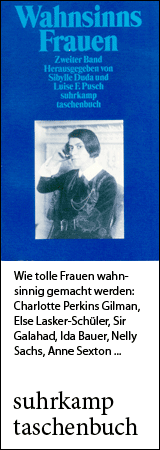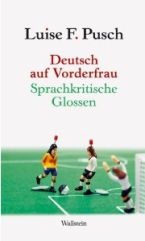Biographies Marieluise Fleißer

born November 23, 1901 in Ingolstadt
died February 1, 1974 in Ingolstadt
German writer, playwright
120th birthday on November 23, 2021
Biography • Literature & Sources
Biography
In a time of controversial transition between traditional and more modern roles for women, Marieluise Fleißer struggled to carve out her identity as a woman writer; as such she bitterly experienced the position of a double outsider, alienated from her middle-class family and her Bavarian Catholic hometown while finding herself marginalized by an urban, male-dominated literary establishment. Her situation was aggravated all the more by the repressions of the Third Reich. Fleißer’s dreams of freedom and a creative life mostly take a negative form in her prose (short stories and a novel) and dramas: her “x-ray vision” penetrates the social and psychological relations between the sexes to reveal the forces that lead most often to women's victimization. The power exerted by men in her own life was fateful.
Marieluise Fleißer was the third child of Heinrich and Anna Fleißer, who had hoped for a boy. But she was favored by her father, a hardware store owner in the provincial town of Ingolstadt, and held a somewhat privileged place within her family — she was excused from typical feminine chores and sent to a convent school in Regensburg to prepare for university study. Her experience in the boarding school is reflected in her early story “Die arme Lovise” (Poor Luise, later retitled “Moritat vom Institutsfräulein,” or Ballad of the Young Lady from a Catholic School), where she asserts: “everything I learned there is bad for my life. I was raised to obey, and they taught me never to reveal anything I felt or wanted.“
In 1919 she began university study of theater, German literature and philosophy in Munich; soon she had abandoned the Catholic dormitory for the freedom of a furnished room in Schwabing, and as a result of this expense could barely afford to eat. Here she had her first serious love affair (with a n'ere-do-well from Luxemburg, who left her behind when he fled to Paris in 1922).
Two major influences on her life at this point were the novelist Lion Feuchtwanger and the young Bert Brecht, both of whom mentored her in her newly self-chosen career as a writer and encouraged her to write in the new literary style of Neue Sachlichkeit (New Objectivity). Her stories, dealing with young people from her small-town provincial milieu, began to be published, and she secretly began a drama, but had to return to Ingolstadt at the end of 1924 because of her father's anger that she had not worked towards the more respectable bourgeois career of teacher as he had wished. Brecht remained a major force in her life, personally and artistically, helping her with publishing contracts and performances of her two first plays, but also manipulating her writing and her love for his own benefit, with disastrous results for her. Her second play, Pioniere in Ingolstadt , which criticized the military as well as the values of the provincial town portrayed, was written at Brecht's urging and was revised by him for its Berlin performance (1929) in order to provoke the police and the censors. The resulting scandal caused Fleißer to break with Brecht and cost her any remaining sympathy she might have had in her hometown, especially among the right-wing nationalists. Her father forbade her to return home.
Somewhat ironically, Fleißer sought security in a relationship with the conservative journalist and poet Hellmuth Draws-Thychsen, which turned out to be even more damaging. Isolated and victimized through the eccentric Draws' rages and demands, finding it ever more difficult to make her way financially, she lost all confidence in herself as a writer: “She doesn’t write a single play, she has been made to feel completely unsure of herself as an artist” (autobiographical sketch). “Sie schreibt kein Theaterstück mehr, sie fühlt sich künstlerisch völlig verunsichert.” After an attempt at suicide, Fleißer returned in 1932 to Ingolstadt, where she was ostracized by family and community; in 1935 Fleißer was virtually forbidden to write by the Nazi regime (she was permitted only to publish 6 feuilletons per year).
In desperation she agreed to marry the tobacco dealer and competitive swimmer Joseph (Bepp) Haindl, from whom she had broken off an earlier engagement. Contradicting an earlier promise, Haindl made his wife work in his tobacco store in addition to doing all the housework, and she had no opportunity to write. In 1938 she suffered hallucinations and a nervous breakdown and underwent a brief hospitalization, but returned determined to write and survive. Continuing deprivations throughout and following the war made writing very difficult, although she was able to produce two dramas and a handful of short stories during the '40s. In the early 1950s the marriage became so unbearable that she considered moving to East Berlin, where Brecht had offered his help, but finally could not bring herself to leave her ailing husband. After his death in 1958 and her own heart attack she finally began rebuilding her career, and, again with the support of better-known males (Rainer Werner Fassbinder, Martin Sperr and Franz Xaver Kroetz), experienced something of a renaissance in the early 1970s.
Author: Joey Horsley
Literature & Sources
Selected Secondary Literature
Beicken, Peter. “Marieluise Fleißer.” Dictionary of Literary Biography Vol 56: German fiction Writers, 1914-1945. Ed. James Hardin. Detroit, MI: Bruccoli Clark, 1987. 94-101.
Beicken, Peter. “Weiblicher Pionier. Marieluise Fleißer — oder Zur Situation schreibender Frauen in der Weimarer Zeit.” die horen 28. Jg. Bd. 4 (Herbst 1983): 45-61.
Brinker-Gabler, et al. Lexikon deutschsprachiger Schriftstellerinnen 1800-1945. Munich: dtv, 1986.
Cocalis, Susan L. “Weib ohne Wirklichkeit, Welt ohne Weiblichkeit. Zum Selbst-, Frauen- und Gesellschaftsbild im Frühwerk Marieluise Fleißers,” in Entwürfe von Frauen in der Literatur des 20. Jahrhunderts. Hrsg. Irmela von der Lühe. Berlin: Argument, 1982. (Argument Sonderband 92).
Fleißer, Marieluise. Gesammelte Werke. 3 Bände. Hrsg. mit einem Vorwort von Günther Rühle. Frankfurt/M.: Suhrkamp, 1973 (Zweite Auflage 1983).
—————Gesammelte Werke. 4. Band: Aus dem Nachlaß. Hrsg. von Günther Rühle in Zusammenarbeit mit Eva Pfister, mit einem Nachwort von Günther Rühle, Frankfurt/M.: Suhrkamp, 1989.
Kraft, Friedrich, ed. Marieluise Fleißer. Anmerkungen, Texte, Dokumente. Mit Beiträgen von Eva Pfister und Günther Rühle. Ingolstadt: Donau Courier, 1981.
McGowan, Moray. Marieluise Fleißer. Munich: Beck, 1987 (Beck'sche Reihe Autorenbücher BsR 601).
Rühle, Günther, Hrsg. Materialien zum Leben und Schreiben der Marieluise Fleißer. Frankfurt: Suhrkamp, 1973 (edition suhrkamp 594).
Sauer, Jutta. “Etwas zwischen Männern und Frauen.” Die Sehnsucht der Marieluise Fleißer. Cologne: Papyrossa, 1991.
Schnabel, Gabriele, and Töteberg, Michael. “Auswahlbibliographie zu Marieluise Fleißer,” text + kritik 64 (October 1979): 88-93.
Soltau, Heide. “Die Anstrengungen des Aufbruchs. Romanautorinnen und ihre Heldinnen in der Weimarer Zeit.” Deutsche Literatur von Frauen. Ed. Gisela Brinker-Gabler. Vol 2. Munich : Beck, 1988. 220-235.
Tax, Sissi. Marieluise Fleißer: Schreiben, Überleben. Ein biographischer Versuch. Basel: Stroemfeld/Frankfurt am Main: Roter Stern, 1984.
Wysocki, Gisela von. “Die Magie der Großstadt. Marieluise Fleißer.” In: G.v.W.: Die Fröste der Freiheit. Aufbruchsphantasien. Frankfurt/M., 1980, S. 9-22.
If you hold the rights to one or more of the images on this page and object to its/their appearance here, please contact Fembio.



